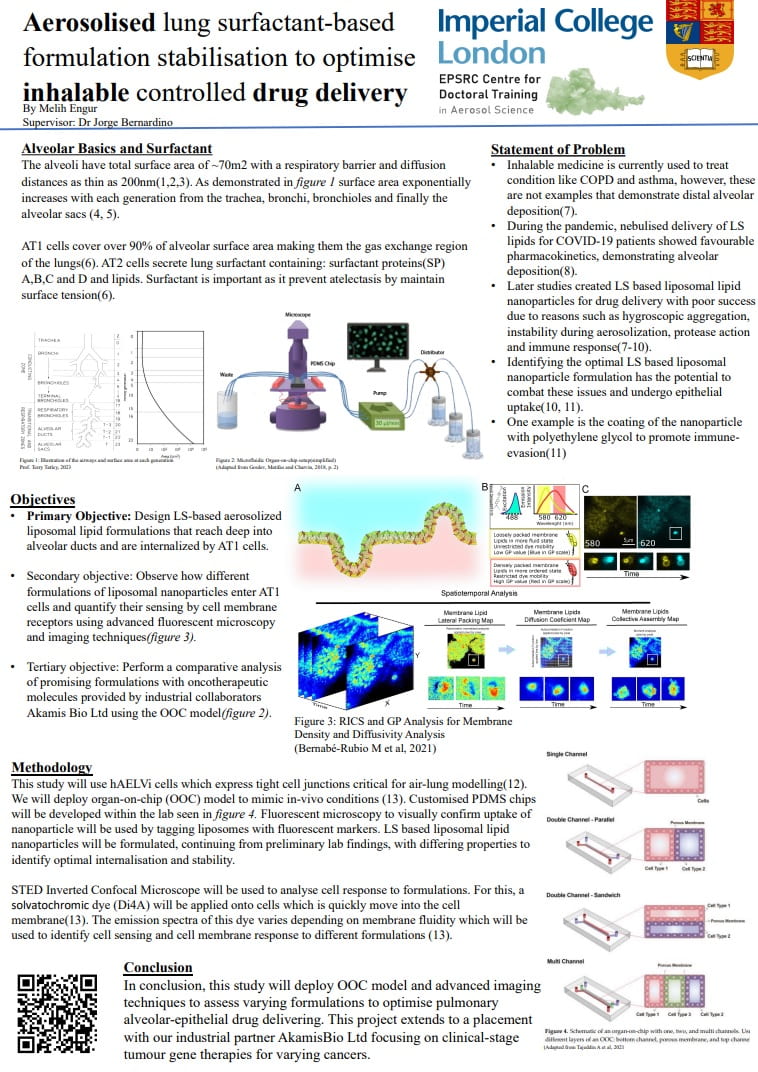Drug Delivery
Aerosols have been widely used to deliver drugs to the lungs to treat respiratory illness for many decades, including the treatment of asthma and chronic obstructive pulmonary disease. They are also increasingly used to treat systemic diseases and deliver vaccines. CDT projects are developing new aerosol formulations to target drug delivery to the lungs, new ways to generate reliable aerosol dose for inhalation with lower carbon footprint, and new approaches to understand aerosol-lung interactions.
Phage therapy for respiratory infections
Respiratory infections caused by antimicrobial resistant (AMR) bacteria accounts for the largest proportion of deaths (1.5 million) attributed to AMR, with Staphylococcus aureus and Pseudomonas aeruginosa being major pathogens. Aerosolized phage therapy has had variable success in treating human lung infections due to challenges in efficient phage delivery. This project aims to understand aerosolization factors impacting phage stability and activity, and develop inhalable phage active against AMR S. aureus or P. aeruginosa.
PhD student: Umut Atik
Cohort: 6
Lead supervisor: Dr Shan Goh, Prof Darragh Murnane, Dr Laura Urbano, Prof. Ian Johnston
Institution: University of Hertfordshire
This project is sponsored in partnership with DSTL
High-dose antibiotics inhalers for acute lower respiratory tract infections in primary care
Since pulmonary drug delivery induces higher antibiotic concentrations in lung tissue, it can be used to reduce antimicrobial resistance and other effects. This project will produce the first type of inhaled antibiotics via electrospray drying (ESD). During ESD, electrically charged monodispersed microdroplets are generated, allowing us to design high-dose antibiotic powders with controlled particle size, shape, and crystal structure. The lung delivery and antimicrobial activity of these powders from a novel high-dose inhaler will then be assessed. This novel approach will (subject to confirmation) be supported by an industrial partner who will host a three-month placement.
PhD student: Xiaojie Sun
Cohort: 5
Lead supervisor: Dr Bernardo Castro Dominguez
Institution: University of Bath
This project is sponsored in partnership with Nanopharm
![]()
Hygroscopic dynamics of solution phase aerosol on generation and inhalation to the lungs
This project investigates the impact of hygroscopic growth on aerosol particle size dynamics from generation and inhalation to the lungs. Utilizing advanced tools like the TAPS, the study measures plume size distributions under varying humidity conditions. These findings will be compared with single-particle properties from the CK-EDB and analysed using models such as the E-AIM and AIOMFAC. The research aims to enhance drug delivery efficiency and accurately predict drug deposition profiles.
PhD student: Nan Zhou
Cohort: 5
Lead supervisor: Prof. Jonathan Reid & Dr Rachael Miles
Institution: University of Bristol
Stability of dry powder formulations used in drug delivery to the lungs studied one particle at a time
Dry powder inhalers are a widely used delivery method to administer medication to the lungs. Despite numerous advantages over other approaches, challenges exist in ensuring product stability and performance. An inability to manage performance changes can have implications for the shelf-life of the medication or can cause routine issues during commercial manufacture of the product. In this project, we will characterise product performance and stability using a variety of conventional tools and compare these studies with measurements of the physicochemical properties and stability of individual aerosolised particles using an electrodynamic balance.
PhD student: Anna Catton
Cohort: 5
Lead supervisor: Prof Jonathan Reid
Institution: University of Bristol
This project is sponsored in partnership with Viatris
Dry water for future inhaled medicines
Dry powders are often ideal for delivery to the airways due to their finely controlled particle size and compatibility with “green” devices for administration, such as user-actuated inhalers. However, many biological molecules cannot be formulated in the dry state due to instability. This project aims to explore “dry water” formulations for delivery to the airways. Dry water is a method of coating water droplets with solids so that they appear as a flowable powder but contain large amounts of water entrapped inside. These materials appear perfect for respiratory delivery and there are enormous opportunities for exploitation remaining.
Michael Cook will be based at the UCL School of Pharmacy and it is anticipated that the student will have opportunity to work between UCL and UH.
PhD student: Oluwatoyosi Akande
Cohort: 5
Lead supervisors: Dr Michael Cook, Prof Darragh Murnane
Institution: University of Hertfordshire
Next-Generation Nasal Drug Delivery Exploiting non-Newtonian Fluids and Smart Thermoresponsive Materials
Nasal sprays are of great importance to the pharmaceutical field, particularly with the possibility of self-vaccination via this route. This project will explore rheological effects in nasal sprays, including the exploitation of “smart” materials which respond to temperature, with the aim of developing next-generation dosage forms.
PhD student: Hessam Rasooli Nia
Cohort: 4
Lead supervisor: Prof Darragh Murnane and Dr Michael Cook
Institution: University of Hertfordshire
Aerosolised lung surfactant-based formulation stabilisation to optimise inhalable controlled drug delivery
This PhD project will develop novel inhalable formulations for lung drug delivery based on the properties of lung surfactant: a natural protective film coating the alveolar epithelium synthesized and recycled in form of self-assembled proteo-liposomes. The student will generate lipid nanoparticles with enhanced stability employing ionic fluids to determine which properties and components favour alveolar epithelium delivery and uptake and benchmark these formulations against commercial pharmacological anticancer drugs.
PhD student: Melih Engur
Cohort: 4
Lead supervisor: Dr Jorge Bernardino de la Serna
Institution: Imperial College London
Environmentally friendly plasma coated inhaler cannisters
Drug delivery from metered dose inhalers is reduced if the drug adheres to or reacts with the aluminium inhaler cannister. Cannisters can be coated with PTFE, but plasma coated cannisters are more environmentally friendly. This project will characterise plasma coated cannisters, their interactions with drugs, and the stability and delivery of drugs.
PhD student: Mahmoud Ahmed
Cohort: 3
Lead supervisor: Dr Matthew Jones
Institution: University of Bath
This project is an industry funded studentship supported by H&T Presspart.

Aerosol Dynamics on Inhalation at High Relative Humidity
Aerosols are used to deliver drugs to the lungs to treat asthma and systemic diseases. The microphysical processes that transform the drug formulation on inhalation to the high humidity of the lungs (e.g. water condensation, dissolution) will be studied using single particle techniques with the aim of improving clinical efficacy.
This studentship is sponsored in partnership with Chiesi
PhD student: Lance Jiang
Cohort: 2
Lead supervisor: Prof Jonathan Reid
Institution: University of Bristol
This project is an industry funded studentship supported by Chiesi.
![]()
Microphysiological models for the assessment of pulmonary concentration of inhaled aerosols
There are significant gaps in our understanding of the links between aerosol deposition sites, binding to lung tissue and the time course of local drug concentrations during inhaled therapy. This project will combine emerging microfluidic, lung-on-a-chip technologies with liquid chromatography-mass spectrometry bioanalysis to explore the ‘holy grail’ of in-lung pharmacokinetics.
PhD student: Caterina Fantuzzi
Cohort: 2
Lead supervisor: Prof Darragh Murnane
Institution: University of Hertfordshire
Particle engineering approaches to control the interaction of medicinal aerosols with the lung environment following inhalation
This article focuses on the delivery of solid drug particles by dry powder inhalers and reviews some of the particle properties that may underpin aerosol dynamics in the humidity of the respiratory system. Furthermore, in response, a novel way to produce monodisperse model particles with distinct characteristics and properties using microfluidic crystallisation techniques is presented.
PhD student: Toria Legh-Land
Cohort: 1
Supervisors: Prof Darragh Murnane (Hertfordshire) and Prof Jonathan Reid (Bristol)
Institution: University of Hertfordshire
This project is an industry funded studentship supported by Chiesi.
![]()
Inhalable nanomedicine for treatment of pulmonary tuberculosis
The rapid spread of multi drug-resistant tuberculosis (TB) is a major threat to global public health. According to WHO ~1.8 million people die every year of TB, with an estimated 9.8 million new infections per year, which is exacerbated due to the number of patients infected with HIV/AIDs. Treatment of TB is lengthy, with the development of drug resistant organisms due to incomplete or inappropriate treatment. We propose that many of the shortfalls of treatment of multidrug-resistant TB could be overcome by reducing the high toxicity and poor efficacy of injectable small molecule antibiotics drugs. The aim of the PhD is to develop an aerosolised, inhalable nanomedicine that delivers first line anti-tuberculous drugs.
PhD student: Khaled Alzahabi
Cohort: 1
Supervisors: Prof Terry Tetley (Imperial) and Dr Alexandra Porter (Imperial)
Institution: Imperial College London

EPSRC CDT in Aerosol Science
University of Bristol
School of Chemistry
Cantock’s Close
Bristol, BS8 1TS
aerosol-science@bristol.ac.uk
Partner Newsletter
Sign up to receive monthly news and updates from the CDT in Aerosol Science, as well as events, training and research webinars.







